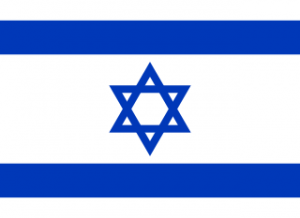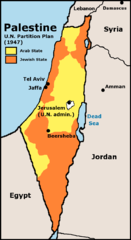http://Israel’s Nuclear Arsenal and Weapons of Mass Destruction: A Threat to World Peace
The British mandate of 1923 created the initial boundaries for the area that is now known as Israel, Palestine, and Jordan. A few years later Winston Churchill removed the Jordan territory from this mandate and created the boundaries for the modern state of Jordan. Between 1919 and 1923, 40,000 Jews arrived in Palestine, mainly escaping the post-revolutionary chaos of Russia, as over 100,000 Jews were massacred in this period in Ukraine and Russia. These few pioneers created a self-sufficient economy and community based on agriculture. Defense organizations like the underground Jewish militia, Haganah (“Defense”), was established to defend outlying Jewish settlements. Steady Jewish immigration followed for the next years although in relatively small numbers. This immigration and community development along with the defense force began to cause friction between the Jewish settlements and their Arab neighbors.
By the end of World War Two, Jewish refugees from Europe started to arrive in vast numbers in the Palestinian territory. This immigration was facilitated by the weak disposition of the British Empire. World War Two left the British and the French bankrupt and looking for an end for to their colonial ambitions and territorial possessions. By the late 1940’s the questioned of that was on all the international community was that of the Palestinian and Jewish problem. On 2 April 1947, the United Kingdom requested that the question of Palestine be handled by the General Assembly. The General Assembly created a committee, United Nations Special Committee on Palestine (UNSCOP), to report on “the question of Palestine”. In July 1947 the UNSCOP visited Palestine and met with Jewish and Zionist delegations. The Arab Higher Committee boycotted the meetings. During the visit the British Foreign Secretary Ernest Bevin ordered an illegal immigrant ship, the Exodus 1947, to be sent back to Europe. The migrants on the ship were forcibly removed by British troops at Hamburg.
The Israeli Declaration of Independence, formally the Declaration of the Establishment of the State of Israel, was proclaimed on 14 May 1948 by David Ben-Gurion, the Executive Head of the World Zionist Organization and the chairman of the Jewish Agency for Palestine. It declared the establishment of a Jewish state in Eretz-Israel, to be known as the State of Israel, which would come into effect on termination of the British Mandate at midnight that day. The United Nations had also set aside about half of the territory for Palestinians however, it was rejected by the Palestinians and the rest of the Arab world. This declaration cemented the discord and the anger between the Palestinians and the Jewish citizens of the new state of Israel. A conflict would soon follow in the first opening act of a long and bloody conflict, the Israeli-Arab Wars. The 1948 War for Independence, the Six Day War, and theYomm Kipor War all were the setting that lead to the development of Israels Weapons of Mass Destruction Program.
We all know that Israel possesses advanced conventional military capabilities and a large weapons industry along with generous support from the United States to support such capabilities. However, Israel for decades has maintained a policy of opacity regarding its WMD programs. While experts generally agree that Israel possesses nuclear weapons, no such current open source consensus exists on the status of Israel’s offensive chemical or biological weapons programs. Israel also possesses a sizeable arsenal of short- and medium-range ballistic and cruise missiles and is working towards a multi-layered and comprehensive missile defense capability. Furthermore, Israel is not a bound to any of the major treaties governing WMD nonproliferation, including the Treaty on the Non-Proliferation of Nuclear Weapons (NPT), the Missile Technology Control Regime (MTCR), and the Biological and Toxin Weapons Convention (BTWC). It has signed, but not ratified, the Comprehensive Nuclear-Test-Ban Treaty (CTBT) and the Chemical Weapons Convention (CWC). However, Israel is considered a “unilateral adherent” to the MTCR and has recently adopted national export control regulations on chemical and biological materials consistent with Australia Group standards.Israel reportedly assembled its first nuclear devices in late May 1967 in the run-up to the Six-Day War. Based on some rough estimates of the plutonium production capacity of the Dimona reactor, Israel is believed to have manufactured around 840 kg of weapons-grade plutonium, enough for an estimated arsenal of 100 to 200 nuclear warheads.
So, how does all of this fit into the great skim of thing? Does Israel use its Nuclear arsenal to affect regional policy? Is Israel a threat to the security of the region because it has WMD’s? Biological and chemical weapons are not part of the Israeli stockpile of WMD’s, according to some intelligence services such capabilities are not currently being seen as viable options for the Israeli government. However, there is evidence that at one point in its short history the State of Israel has considered such options. Israel’s arsenal has been largely ignored by the major powers. Possessing extremely sophisticated nuclear arsenal, and an aggressive strategy for their actual use, Israel provides the major regional impetus for the development of weapons of mass destruction and represents an acute threat to peace and stability in the Middle East. This is partly to the new Iranian Nuclear program. the Iranians see the Israeli nuclear capability as a direct threat to their existence and vice versa.the Israelis see the development and possession of such weapons as a direct necessity for their own survival. The Israeli’s currently enjoy the upper hand in a deterrent strategy do to the lack of an “Arabic Bomb.” My belief is that for this reason the further spread of WMD”s in the middle east is a threat to the security of the world and the United States. We may be seeing the start of mass proliferation of these weapons in the middle east once Iran gets the “bomb.” The next logical regional power to strive for the “bomb” would be Saudi Arabia.
I believe that the major impact that Israel currently enjoys in regards to regional policy in regards to their nuclear program, is one of regional military supremacy. this impedes a direct military action on the part of Iran or its Arab neighbors. So, I believe that the strong democratic government on behalf of the Israelis along with a political realist attitude has maintained the peace. Israel’s string of victories against their Arab neighbors has traumatized the Arab world and lead more and more to seek a victory against Israel using militant tactics.

